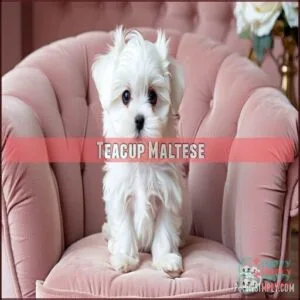This site is supported by our readers. We may earn a commission, at no cost to you, if you purchase through links.
 If you’re searching for the best teacup dog breeds, check out beloved favorites like the Teacup Poodle, Chihuahua, Maltese, and Yorkshire Terrier.
If you’re searching for the best teacup dog breeds, check out beloved favorites like the Teacup Poodle, Chihuahua, Maltese, and Yorkshire Terrier.
These tiny companions weigh just 2-5 pounds, but their charm is larger than life.
They’re perfect if you enjoy cuddly pets that fit in your lap (or even your bag!), and while their small size makes them adorable, teacup dogs require extra care due to their fragile health.
Like managing hypoglycemia and protecting them from accidental injuries, each breed has its own traits, so think about what suits your lifestyle best.
Curious about care tips for these pint-sized pups? Keep reading!
Table Of Contents
- Key Takeaways
- What Are Teacup Dogs
- Popular Teacup Breeds
- Teacup Dog Health Risks
- Choosing Best Teacup Breed
- Teacup Dog Care Tips
- Teacup Dog Breed Comparison
- Owning a Teacup Dog
- Frequently Asked Questions (FAQs)
- What is a teacup puppy?
- Are teacup dogs small dogs?
- Are teacup dogs healthy?
- What dog breeds come in teacup sizes?
- What is the smallest teacup dog?
- Are teacup Fox Terriers good dogs?
- What is the easiest teacup dog to train?
- What is the friendliest tiny dog?
- What is the smartest teacup dog?
- What’s the best teacup dog?
- Conclusion
Key Takeaways
- Teacup dogs are incredibly small, weighing under 5 pounds, but they need extra care due to health risks like fragile bones and hypoglycemia.
- Popular teacup breeds include the Teacup Poodle, Chihuahua, Maltese, and Yorkshire Terrier, each with unique traits and care needs.
- Responsible ownership means finding ethical breeders, staying on top of vet care, and ensuring proper nutrition and gentle handling.
- While adorable, these tiny dogs can be costly due to specialized care and potential medical expenses, so plan ahead for long-term commitment.
What Are Teacup Dogs
Teacup dogs are tiny versions of toy breeds, typically weighing under 5 pounds and standing less than 17 inches tall when fully grown.
Adorable and portable, teacup dogs pack big personalities into tiny frames, making them irresistible companions for devoted owners.
These miniature pups aren’t officially recognized as a breed, but their small size and portability make them a popular choice for dog lovers.
Teacup Dog Definition
Teacup dogs are the smallest of tiny dog breeds, usually falling under toy dog breeds.
They’re not officially recognized by kennel clubs but are adored for their cute size.
Here’s what to know:
- Size Classifications: Weigh 4-6 pounds or less.
- Terminology Origins: "Teacup" isn’t official.
- Breed Standards: No set rules.
- Ethical Concerns: Often involve risky breeding practices.
Teacup Dog Weight and Height
In the case of teacup dog size, these pint-sized pups weigh between 2 and 6 pounds and stand less than 17 inches tall.
Growth factors vary by breed variations, but teacup dog weight is carefully maintained to meet size standards.
Height comparisons within teacup dog breeds highlight their compact charm, making them perfect for those who prefer smaller dog sizes over larger ones.
Teacup Dog Breed Characteristics
When you’re looking at teacup dog breeds, there are a few unique traits to keep in mind.
Their size variations and tiny frames make them irresistibly cute, but they also bring specific needs.
Here’s what to bear in mind:
- Compact teacup dog size and weight under 6 pounds.
- Coat types range from fluffy to sleek.
- Temperament traits differ across breeds.
- Origins often link to toy breeds.
- Moderate activity levels suit their size.
Popular Teacup Breeds
If you’re looking for the cutest compact companions, popular teacup breeds offer plenty of options.
From the smart Teacup Poodle to the tiny Teacup Chihuahua, these dogs combine charm with petite size.
Teacup Poodle
The Teacup Poodle stands out among small dog breeds with its intelligence and elegance.
Known for their friendly Poodle temperament, these tiny companions adapt well to training but require patience for overcoming training challenges.
Their grooming needs are high, demanding regular upkeep.
As one of the most popular Teacup dog breeds, they’re prone to genetic predispositions, so prioritize dog health.
Teacup Chihuahua
Among teacup dog breeds, the Teacup Chihuahua stands out with its tiny size variations and bold temperament traits.
Weighing under 6 pounds, they’re confident, loyal, and energetic, though their fragile bones require careful handling.
Grooming needs are minimal, but training challenges arise due to their stubborn streak.
These small dog breeds need special attention to prevent health issues like hypoglycemia.
Teacup Yorkshire Terrier
The Teacup Yorkie steals hearts with its bold personality and elegant looks.
These miniature Yorkshire Terriers, a favorite among small dog breeds, require consistent grooming to maintain their silky coats.
While their lifespan can reach 12-15 years, their feisty temperament may pose training challenges.
They’re also susceptible to genetic health issues, so regular vet visits are important.
Finding reputable Yorkie breeders is key to ensuring your Teacup Yorkie thrives as a loyal, charming companion.
Teacup Maltese
Known for their silky white coat and gentle nature, the Teacup Maltese is a standout in miniature dog breeds.
These small dog breeds have roots tracing back 2,000 years, making Maltese history truly fascinating.
With a lifespan of 9-15 years and a focus on regular Maltese grooming, they’re ideal companions.
Expect Maltese cost to reflect their elegant reputation among teacup dog breeds.
Teacup Dog Health Risks
In regard to teacup dogs, their tiny size comes with serious health challenges you’ll need to take into account.
From fragile bones to conditions like hypoglycemia, these little pups require extra care to stay healthy.
Hypoglycemia and Symptoms
Hypoglycemia is a common dog health problem in teacup dog breeds due to their small size and fast metabolism.
Recognizing symptoms like weakness, seizures, or lethargy is key.
Preventing hypoglycemia involves frequent, balanced meals suited to their needs.
Treating hypoglycemia quickly can save your dog from serious health issues.
Focus on diet and care to avoid these health problems.
Liver Shunts and Risks
Liver shunts are serious health issues in teacup dog breeds, often caused by poor breeding practices.
These shunts bypass liver filtration, leading to toxin buildup, seizures, or stunted growth.
Shunt diagnosis requires tests like ultrasounds or bloodwork.
Treatment includes surgical options or lifelong medical management.
Proper dietary needs and ethical breeding improve long-term prognosis, but these dog health problems remain challenging.
Fragile Bones and Fractures
Teacup dog breeds often struggle with fragile bones, leading to fractures from minor accidents.
Their genetic predisposition to bone fragility demands extra care:
- Monitor activity levels to prevent overexertion.
- Ensure proper calcium intake for better bone density.
- Avoid rough handling to minimize injury risks.
- Provide padded surfaces for extra safety.
Handle with care, as even playful moments can cause harm.
This is exacerbated by potential collapsing trachea issues.
Shortened Lifespan
Teacup dog breeds often face shortened lifespans due to breeding practices and genetic predispositions.
Health risks like organ failure, immune deficiencies, and accelerated aging can reduce their average survival by 2-4 years.
| Risk Factor | Cause | Impact | Solution |
|---|---|---|---|
| Organ failure | Poor breeding | Shortened lifespan | Early vet checks |
| Fragile bones | Tiny frames | Limited mobility | Gentle handling |
| Immune deficiencies | Inbreeding | Frequent illness | Boost immunity |
| Accelerated aging | Genetic issues | Reduced lifespan | Focus on health care |
The provided table outlines specific risk factors associated with teacup dog breeds, including fragile bones and immune deficiencies, along with their causes, impacts, and potential solutions to mitigate these issues.
Choosing Best Teacup Breed
When picking the best teacup breed, focus on health and temperament to guarantee a good fit for your home.
Research breeders carefully to find those who prioritize ethical practices and the dog’s well-being.
Researching Reputable Breeders
Finding reputable breeders guarantees your teacup pup’s health.
Avoid puppy mills and breeders focused only on size.
Look for:
- Genetic Testing: Guarantees healthier teacup dog breeds by screening for diseases.
- Health Guarantees: Reliable breeders stand by their dogs’ well-being.
- Ethical Practices: Breeders prioritizing care, not profit.
- Transparency: Trust those showing breeding practices openly.
Your breeder choice shapes your dog’s future.
Prioritizing Health and Temperament
Choosing teacup dog breeds means balancing size with well-being.
Focus on ethical breeding and temperament testing to avoid long-term dog health issues.
Look for breeders offering genetic screening and health guarantees to guarantee healthy, happy pups.
Prioritize teacup dog temperament over size—calm, adaptable dogs make life easier.
Responsible ownership starts with selecting dogs bred with care, not just for their tiny size.
Toy Breeds as Healthier Alternative
Small dog lovers, consider toy breeds as healthier alternatives to teacup dog breeds.
They’re robust, maintaining genetic diversity and strong breed standards. Ethical breeding reduces health risks and supports better dog health.
Look for these popular toy breeds:
- Yorkshire Terrier
- Miniature Pinscher
- Pomeranian
- Shih Tzu
- Maltese
Toy breeds balance small size with longevity and energy. Many owners appreciate their gentle temperament, making them ideal family pets.
Teacup Dog Care Tips
Caring for a teacup dog means focusing on their unique needs, like a specialized diet and gentle handling, to keep them healthy and safe.
You’ll also need to watch for potential health issues since their small size makes them more fragile than larger breeds.
Specialized Nutrition and Diet
Tiny stomachs mean frequent feeding is a must for teacup dog breeds. Their calorie requirements are high, needing meals every few hours to avoid hypoglycemia.
Keep them hydrated with fresh water daily. Many owners find specialized teacup food beneficial for their pets.
| Aspect | Frequency | Importance |
|---|---|---|
| Feeding | Every 2-4 hours | Prevents hypoglycemia |
| Supplements | 2-3 times daily | Boosts energy |
| Hydration | Always accessible | Avoids kidney issues |
Limited Exercise and Safety Precautions
Teacup dog breeds need gentle handling and safety-focused care. Their fragile bones can’t handle rough play or jumping from heights.
Provide supervised playtime in safe environments to prevent injuries and overheating. Indoor play and leash training are perfect for exercise without risking dog breathing issues.
A good option for safe play is a dog playpen indoors. Prioritize their well-being with soft bedding and calm spaces to reduce stress and dog health issues, ensuring a safe and healthy environment.
Potential Medical Expenses
Vet bills for teacup dog breeds can be steep due to their fragile health.
You’ll face costs from regular preventative care, medication, and managing dog health issues like fractures or hypoglycemia.
Proper planning helps:
- Set aside emergency funds for unexpected accidents.
- Explore insurance options to ease expensive treatments.
- Prevent health risks with routine check-ups and careful handling.
Teacup Dog Breed Comparison
When comparing teacup dog breeds, it’s important to focus on their unique traits, including size, temperament, and care needs.
This guide highlights popular breeds like the Micro Chihuahua, Mini Maltese, and Russian Toy to help you make an informed choice.
Micro Chihuahua Characteristics
Although Chihuahuas are naturally small, the Micro Chihuahua takes tiny to a whole new level.
These teacup dog breeds boast a bold temperament and fit snugly into your lap. With fragile bones and delicate health, they require gentle care.
Their size variations and unique markings charm many dog lovers, though breeding practices raise ethical concerns. These dogs are especially prone to developing hypoglycemia, requiring frequent feeding.
Characteristic Detail
Weight
Height
Activity Levels
Grooming Needs
Mini Maltese Breed Information
The Maltese is a dream among teacup dog breeds.
Known for their gentle Maltese temperament, they’re sweet companions wrapped in silky white coats. Grooming needs can be high, but their playful spirit makes up for it.
Trait Details
Stay mindful of teacup dog care and regular health screening.
Russian Toy Breed Overview
The Russian Toy stands out among teacup dog breeds with its elegant charm, playful nature, and rich historical origins.
Known as one of the tiniest toy breeds, these small dogs bring big personalities to loving homes.
Their delicate frames and affectionate temperament traits make them ideal companions for adults, with loyal and playful characteristics being particularly notable.
| Breed Standards | Temperament Traits | Grooming Needs | Exercise Requirements |
|---|---|---|---|
| 8–11 inches tall | Loyal, playful | Minimal combing | Light, indoor play |
| 3–6 pounds | Intelligent, social | Occasional baths | Short walks indoors |
The breed’s intelligent and social nature, combined with their minimal grooming needs and light exercise requirements, make them a popular choice for many dog owners.
Owning a Teacup Dog
Owning a teacup dog means taking on a big responsibility for a very small companion.
You’ll need to weigh factors like their fragile health, specialized care, and long-term costs before bringing one home.
Suitability for Families With Children
Teacup dog breeds can fit into family life, but they’re not always ideal for children.
Their small size requires gentle handling and constant supervision.
Consider these factors:
- Child Temperament: Calm children suit teacups better.
- Safety Concerns: Tiny dogs are fragile.
- Training Challenges: Behavior training is essential.
- Socialization: Guarantees positive interactions.
Choose breeds with friendly temperaments for better compatibility.
Importance of Responsible Dog Ownership
Owning teacup dog breeds means honoring their lifetime commitment.
Research ethical breeding practices and avoid puppy mills, which often neglect dog health. Look for breeders who prioritize genetic testing to reduce health risks.
Adoption benefits are worth exploring too; many tiny dogs need loving homes. Responsible ownership isn’t just trendy—it guarantees your pup thrives physically and emotionally for years.
Cost of Teacup Dogs and Expenses
Caring for tiny teacup dogs can weigh heavily on your wallet.
Their initial purchase often ranges from $1,500 to $6,000 due to selective breeding practices.
Ongoing expenses include:
- Veterinary expenses for their fragile health
- Food budget suited to tiny appetites
- Grooming costs for high-maintenance coats
- Accessories price, like small beds and carriers
Teacup dog prices reflect their specialized care.
Owners often need to buy specialized teacup dog food.
Long-term Commitment and Care Requirements
Caring for a teacup dog requires time, patience, and emotional investment.
These tiny dogs demand constant attention due to dog health issues like fragile bones and hypoglycemia.
Their teacup dog lifespan can feel short, making every moment precious.
Lifestyle changes, training patience, and ethical dog breeding practices guarantee their well-being.
Be ready for the financial burden linked to ongoing care needs.
Frequently Asked Questions (FAQs)
What is a teacup puppy?
A teacup puppy is an extra tiny dog, typically under 5 pounds when fully grown.
They’re bred as miniature versions of toy breeds, making them super cute but also more prone to health issues.
Are teacup dogs small dogs?
Not to state the obvious, but yes, teacup dogs are small dogs—tiny, actually.
They’re miniature versions of toy breeds, often weighing under 5 pounds fully grown.
Think pint-sized pups with oversized personalities!
Are teacup dogs healthy?
They’re adorable but often fragile.
You’ll find teacup dogs face health challenges like fragile bones, heart issues, or hypoglycemia.
Regular vet care and careful handling are key to keeping these tiny companions healthy and happy, which involves understanding their specific needs to prevent issues like fragile bones.
What dog breeds come in teacup sizes?
You’ll find teacup versions of popular breeds like Chihuahuas, Pomeranians, Maltese, Yorkshire Terriers, and Poodles.
These tiny companions pack big personalities into small frames, making them charming but delicate pets requiring extra care.
What is the smallest teacup dog?
In the case of tiny companions, the Teacup Chihuahua steals the show.
Weighing less than 3 pounds and standing just 5 inches tall, it’s the absolute smallest, but it still boasts a big personality!
Are teacup Fox Terriers good dogs?
Teacup Fox Terriers can make great pets if you’re ready to provide proper care.
They’re lively, intelligent, and loving but need careful handling due to their small size and fragile bones.
Socialization is key.
What is the easiest teacup dog to train?
Around 90% of teacup Poodles excel in training because they’re highly intelligent and keen to please.
With consistent training and positive reinforcement, you’ll have a quick learner who thrives on mental challenges and rewards.
What is the friendliest tiny dog?
Chihuahuas are the friendliest tiny dogs, known for their bold, loving nature.
They’ll stick to your side like glue, always ready for cuddles or playtime.
These pint-sized pals are big-hearted companions in a small package.
What is the smartest teacup dog?
You’re looking for brains in a tiny package?
The Teacup Poodle stands out.
Known for high intelligence, they’re quick learners and love challenges—perfect for training tricks or even some fun brain games at home.
What’s the best teacup dog?
The best teacup dog depends on your lifestyle.
If you want a playful companion, a Teacup Pomeranian might shine.
Prefer loyalty and elegance? A Teacup Maltese fits well.
Each breed offers unique qualities to love!
Conclusion
Surprisingly, for such small dogs, teacup breeds come with big responsibilities.
Whether you’re drawn to the Teacup Poodle’s intelligence, the Chihuahua’s boldness, or the Maltese’s elegance, choosing the best teacup dog breed means understanding their unique needs.
These tiny companions need extra care, from specialized diets to protection from injuries.
They can be costly and fragile, but they’ll bring joy if you’re prepared for the commitment.
Pick wisely, and you’ll enjoy a loving, pint-sized best friend.


















